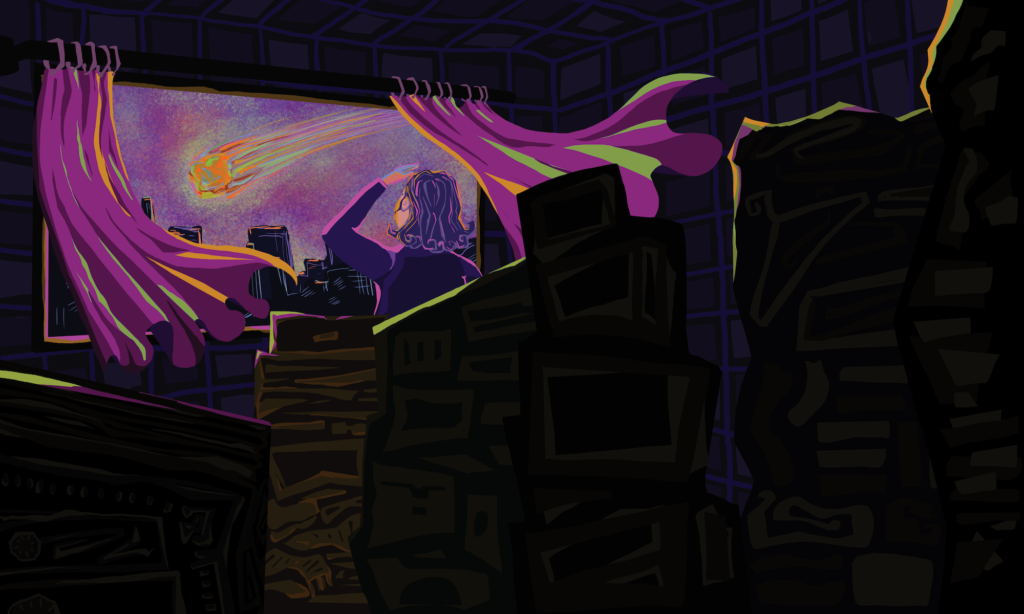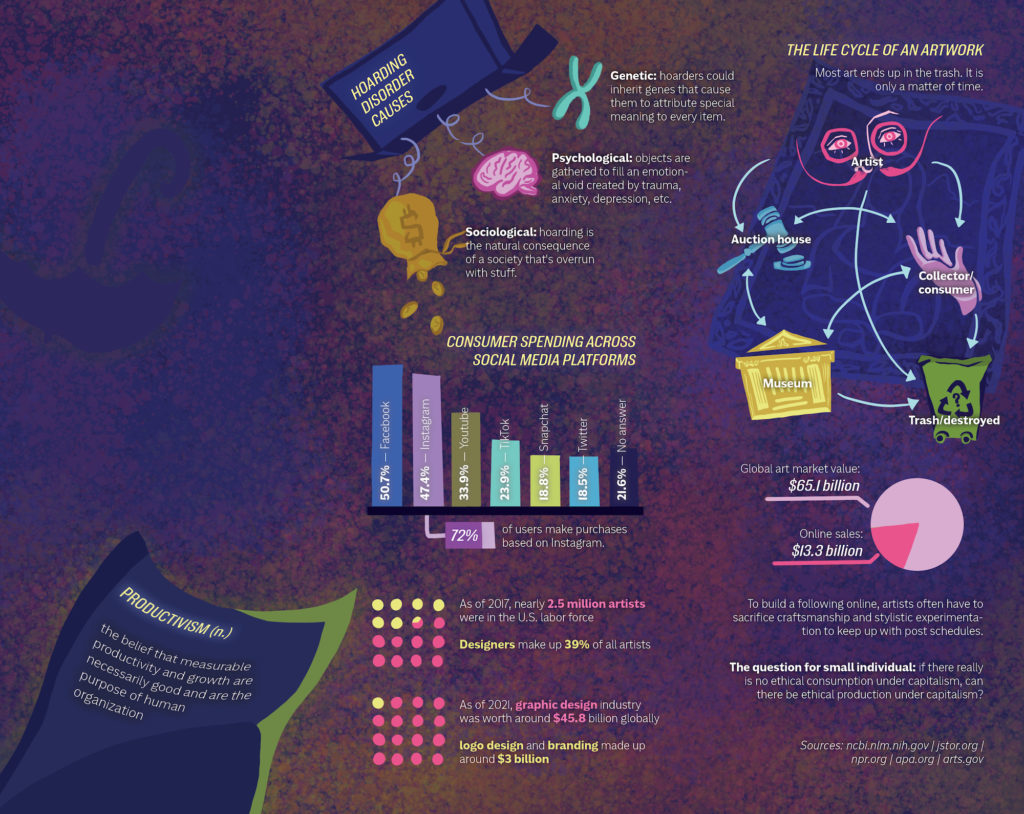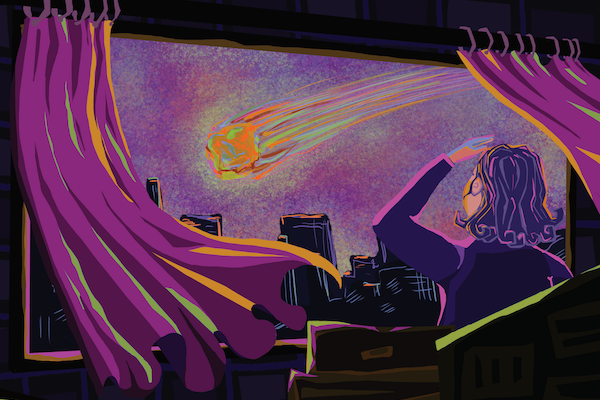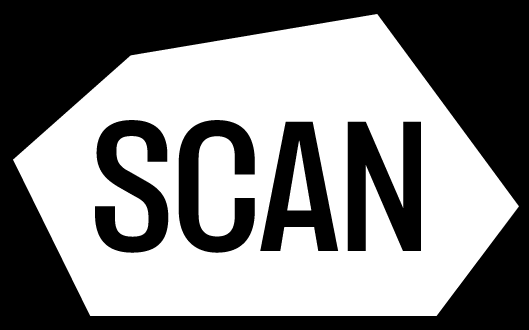As apocalyptic asteroid approaches, an artist apologizes.
Written and illustrated by Julie Tran

Ah, well, this seems to be the end, folks. As the window outside my over-cluttered hovel of a studio apartment lights up with the tail blaze of the life-ending asteroid, I feel it is only right to resolve some grievances I have caused you. Consider it my last chance for spiritual clarity before the moment of collision and we all find out instantly, all at once, whether there are spirits or not. But I digress. Here are some of the apologies I must deliver:
To my super:
You wore a pitying, “you-live-like-this?” face whenever you came up to fix the fridge or unclog the sink, and I very much resented you for it. But now, seeing as our time on Earth is way more limited than I thought, I must let you know I am sorry for making you zig-zag your way through mountains of newspapers, sketchbooks, paintings and boxes — a journey that undoubtedly took whole minutes off your short life. But more importantly, I must also let you know that I am not a hoarder. Hoarders are anxious, depressed, ill people who can’t separate with their garbage because of their exaggerated sense of responsibility or opportunity in the future. I am an artist. And I really, truly need all my stuff because it’s totally going toward this other project I’m working on, hopefully done in humanity’s last fifteen minutes. I’m perfectly fine.
To the mover I hired on TaskRabbit:
$30/hour seemed really not worth it by the end of your endeavor to help me transfer all my possessions into my now-apartment. To be fair, I am poor, as are most totally-not-hoarder types, and you were the cheapest mover on the site. If reincarnation is real, maybe think about raising your rates in the next life, so you can avoid people like me. For now, you can spend your final moments blaming the market. Actually, let’s blame the market together. What is hoarding if not the natural conclusion of capitalism — a hoarder’s system, truly, where humanity’s folly was thinking that a man could control his stuff, instead of the other way around. The three bins of broken easels, bed frame bits and McDonald’s Happy Meal toys you lugged up weren’t trash, they were investments. What if I had needed a half-melted plastic Minion’s head and a plank of splintery plywood? What would you expect me to do? Go out and buy them? In this economy? Yeah, right.
To my painting professor:
You have the zeal and artistry of Leonardo (the Italian one), truly a Throwback Thursday to before the institutionalization of art. You, who believe the artist still retains a mystic aura of genius around them, surely you would not mind the towering structures of stuff amidst which I now sit. It is where the good artist differ from the good consumer, is it not? The good consumer acquires stuff, keeps the good stuff and throws out the bad stuff. To the good artist, all stuff is good stuff. (My four years of laughing at high schoolers who didn’t understand non-destructive workflow in Photoshop and Cloud backups are based on this, so please don’t invalidate it now.) If some rich weirdo in an asteroid-proof basement can clutch with Göring-like vigor the preliminary sketches to Picasso’s “Les Demoiselles d’Avignon,” I can sit here and clutch the hard drives that housed the sketches to my Double-Stuffed Wasabi-Onion Oreo package design, an NFT artwork that depicts the Amazon forests being burnt by robots and two terabytes of Instagram Reels.
It is the Instagram Reels that I must apologize for — they must have offended your fine sensibilities. They are far from Michelangelo’s “David,” are they not? I was merely going with the flow — and we artists have had quite a dramatic flow: from mere artisans to mystic geniuses, to girlbosses and content creators. If all the Instagram Reels of us just making stuff were gathered in one place, how many acres of servers would that make? My 30 hard drives seem paltry by comparison. Sure, the “Mona Lisa” might be worth $860 million. But an NFT of a one-minute video of ol’ Leo painting the “Mona Lisa” over a catchy Michael Bublé chorus? It could have funded enough rockets to reduce that asteroid into confetti. For peace of mind in our last seven minutes, let us blame Leonardo’s time, when the girls obviously weren’t bossing hard enough.
To the hoarders whose piles my work ended up in:
Hey, I never meant for the packaging design of Double-Stuffed Wasabi-Onion Oreo to be that pretty. Same goes for the seven-layer unboxer’s delight that housed the iPhone Double-X Ultra Plus (pretty sexy when a hologram of Steve Jobs jumped out when you lifted the charger from its spot, eh?). If these things end up in a precarious pile waiting to fall on you the moment the earth shakes, forgive me, I’d only spent the bulk of my higher education learning how to entrap customers with beautiful graphics, to transform a $6 bottle of wine into something that looks $12, to cover non-biodegradable plastic with trees, sans-serif typography and whatever way I could spice up the words “eco-friendly” and “natural.” But hey, none of that plastic ended up in a turtle’s digestive tract or a landfill. It remains in your house! The wrappers that your Things™ come in have graduated to be a Thing™ in its own right, at least in your eyes. I am glad. Did my productivism somewhat sate your consumerism? Did the baby mascot I designed for a toilet paper brand and the printed T-shirt sold on my now-defunct online shop somewhat fill the void the civilized world bore into you? I only ever wished to be of service. As you know, the road to the nearest Amazon warehouse was paved with good intentions, right before they covered it plastic wrap.
If any of your loved ones have left you because you chose your pile of stuff over them, I must apologize
for that, too. The good news is, in the last ninety-three seconds of all life, you could reasonably ask for a reconciliation on the grounds that all of this stuff that you hold most dear, artful and artless alike, are going up in flames. Sixty seconds now.
Cacophony in the distance. Explosions, I hear, as civilized society and its refineries — antique furniture, humor magazines, rare old posters, collectible toys — combust. Would it have been better to live a life without them? Would it have been better if we hadn’t let what we consume, consume us? My possessions are coming down on me. Our downfall, like our ascent, is monstrously loud. And yet, if you really focus, you could almost hear Leonardo (the other one), in an attempt at a Midland accent, musing as serenely as a god.
“We really did have everything, didn’t we?”
Yes, we did, Leo. Arguably too much.


